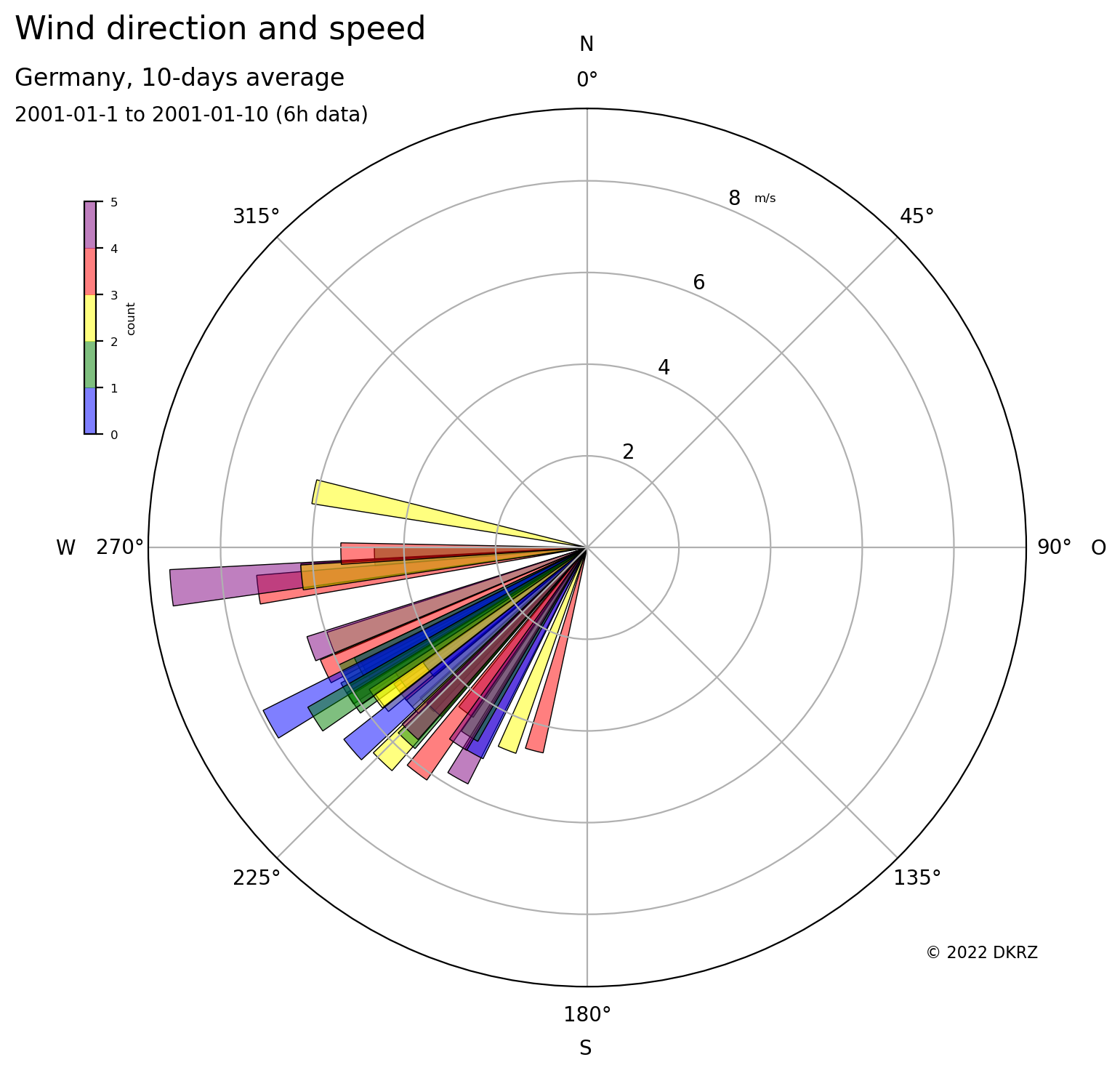Python wind speed and direction plot colored by frequency#
Software requirements:
Python 3
xarray
numpy
matplotlib
Example script#
wind_dir_speed_circular_plot_colored_by_frequency.py
#!/usr/bin/env python
# coding: utf-8
'''
DKRZ example
This example demonstrates how to plot the 10-days wind direction and speed
average for Germany colored by the frequency.
Bar length: wind speed
Bar color: count
-------------------------------------------------------------------------------
2022 copyright DKRZ licensed under CC BY-NC-SA 4.0
(https://creativecommons.org/licenses/by-nc-sa/4.0/deed.en)
-------------------------------------------------------------------------------
'''
import os
import xarray as xr
import numpy as np
import matplotlib as mpl
import matplotlib.pyplot as plt
from matplotlib import cm
def main():
#-- Read the data set from file
fname = '../../data/rectilinear_grid_2D.nc'
ds = xr.open_dataset(fname)
#-- Next, we want to extract a smaller region (northern Germany) to take a closer
#-- look at the data there.
#-- First, we create the mask using the dataset coordinates.
mask = ((ds.coords['lat'] > 47.25)
& (ds.coords['lat'] < 55.5)
& (ds.coords['lon'] > 5.8)
& (ds.coords['lon'] < 15))
#-- Now, use the mask to set all values outside the region to missing value.
u = xr.where(mask, ds.u10, np.nan)
v = xr.where(mask, ds.v10, np.nan)
#-- Compute the wind direction
wind_dir = np.arctan2(v,u) * (180/np.pi) + 180.
#-- Compute the wind speed (magnitude)
wind_speed = np.sqrt(u**2 + v**2)
#-- Compute the averages
wind_diravg = np.mean(wind_dir, axis=(0,1))
wind_speedavg = np.mean(wind_speed, axis=(0,1))
#-- Set levels
levels_min = 0.0
levels_max = 10.0
levels_step = 0.2
levels = np.arange(levels_min, levels_max, levels_step)
#-- Count values by wind_speed
counts, bin_edges = np.histogram(wind_speedavg, bins=levels)
max_counts = counts.max()
#-- Colormap definition
colors = ['blue', 'green', 'yellow', 'red', 'purple']
alpha = 0.5
colors_rgba = np.zeros((len(colors),4), np.float32)
for i in range(0,len(colors)):
c = np.array(mpl.colors.to_rgba(colors[i]))
colors_rgba[i,:] = c
colors_rgba[i,3] = alpha
cmap = mpl.colors.ListedColormap(colors_rgba)
bounds = range(0, len(colors)+1, 1)
norm = mpl.colors.BoundaryNorm(bounds, cmap.N)
#-- The plot function `bar()` has to be used with the **polar projection** which
#-- is set in the `subplots()` call. After drawing the bars, the color of each
#-- bar is changed according to the wind speed.
#-- Per default the angles are drawn counterclockwise with N at 3 o'clock,
#-- that's why we have to set N to 0 deg at top and the theta direction to clockwise.
#--
#-- Furthermore, a colorbar, titles, and copyright text are added. The final plot
#-- is written to a PNG file.
#-- Define angles array
theta_step = 5
theta_num = int(360/theta_step)
theta_arr = np.radians(wind_diravg)
#-- bar width
bwidth = (2*np.pi)/theta_num
#-- initialize the figure and axis
plt.switch_backend('agg')
fig, ax = plt.subplots(subplot_kw={'projection': 'polar'})
#-- plot the histogram bars using polar projection
bars = ax.bar(theta_arr, wind_speedavg,
color=cmap.colors,
width=bwidth,
bottom=0.)
#-- theta=0 set N at the top; theta increasing clockwise (= wind comes from)
ax.set_theta_zero_location('N')
ax.set_theta_direction(-1)
#-- add a colorbar
ax1 = fig.add_axes([0.09, 0.6, 0.01, 0.2], autoscalex_on=True) #-- x,y,w,h
cbar = fig.colorbar(mpl.cm.ScalarMappable(cmap=cmap, norm=norm),
cax=ax1,
boundaries=bounds,
ticks=bounds,
orientation='vertical')
cbar.ax.tick_params(labelsize=6)
cbar.set_label(label='count', size=6)
#-- add geographic directions
plt.gcf().text(0.50, 0.954, 'N', fontsize=10)
plt.gcf().text(0.85, 0.484, 'O', fontsize=10)
plt.gcf().text(0.50, 0.025, 'S', fontsize=10)
plt.gcf().text(0.135, 0.485, 'W', fontsize=10)
#-- add some text
plt.gcf().text(0.02, 0.95,'Wind direction and speed', fontsize=12)
plt.gcf().text(0.02, 0.9, 'Germany, 10-days average', fontsize=9)
plt.gcf().text(0.02, 0.87,'2001-01-1 to 2001-01-10 (6h data)', fontsize=6)
#-- add units to plot
plt.figtext(0.65, 0.8, ds.u10.attrs['units'], ha="right", fontsize=6)
#-- add copyright
plt.figtext(0.85, 0.01, "© 2022 DKRZ", ha="right", fontsize=4)
#-- save plot to PNG file
plt.savefig('plot_wind_dir_speed_count_circular.png', bbox_inches='tight', dpi=200)
if __name__ == '__main__':
main()
